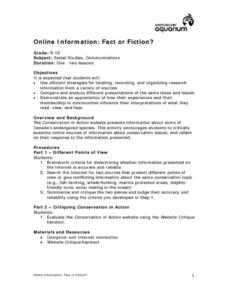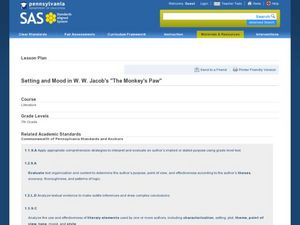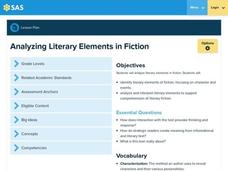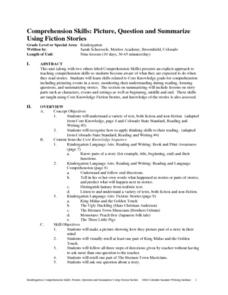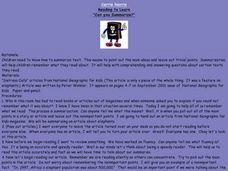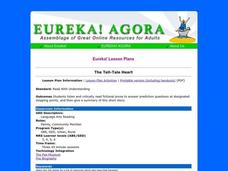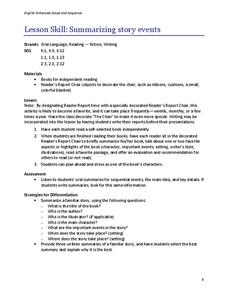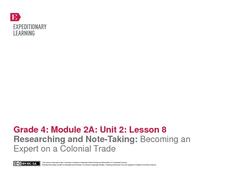Syracuse City School District
Summary of Fiction and Non-Fiction Text
Somebody Wanted But So Then (SWBST)? Yes! Here's a great strategy for teaching young readers how to summarize narrative text. In addition, the packet includes exercises that show kids how to summarize nonfiction text using the classic...
Polk Bros Foundation
How to Summarize a Non-Fiction Passage
After reading a text, one way to find out how much your class comprehended is to ask your pupils to summarize. This worksheet helps class members prepare for writing a summary of a nonfiction text. They note down the topic, up to eight...
Curated OER
Online Information: Fact or Fiction
Discuss ways to determine if the information middle and high schoolers gather online is accurate. Using the Internet, they cite two sources that show conflicting points of view on a subtopic of conservation. They summarize and analyze...
Curated OER
Summarizing with Somebody Wanted But So
Teach your young readers how to summarize a text using a strategy called Somebody Wanted But So. Kids identify the character (Somebody), the motivation (Wanted), the conflict (But), and the resolution (So). The resource comes with...
Curated OER
The Importance Setting and Mood in Fiction
Seventh graders examine the setting in pieces of fiction. In this story analysis lesson plan, 7th graders investigate the setting in fictional stories and the importance it has. Students discover new vocabulary terms applying to...
Curated OER
Introducing Literary Elements in Fiction
Identify literary elements in fiction. In this reading comprehension lesson, learners read the book Pigsty and record literary elements onto a graphic organizer. They specifically discuss the main characters and events in the text.
Mary Pope Osborne, Classroom Adventures Program
The Backpack Travel Journals
Strap on those backpacks, it's time to travel through history with this literature unit based on the first four books of The Magic Tree House series. While reading through these fun stories, children create story maps, record interesting...
Curated OER
Summarizing Key Information
Imagine the surprise when small groups present their Evidence Charts to the class and discover that each group has studied a different version of the Cinderella story. Irish, Ojibwa, Egyptian, Chinese, Korean, Persian, Mexican, and...
Pennsylvania Department of Education
Analyzing Literary Elements in Fiction
Students analyze the characters and events in fictional writing. In this literary elements instructional activity, students study the meaning of the words characterization and fiction. They listen to the story Pigsty by Mark Teague, or...
Curated OER
Civil War Literature Circle
Historical fiction can be a valuable asset when learning about the past. Integrate several novels written about the Civil War into your social studies unit, with groups of four working collaboratively to comprehend the novel from...
Curated OER
Comprehension Skills: Picture, Question and Summarize Using Fiction Stories
Students build a variety of comprehension skills through the nine lessons of this unit. Picturing events, monitoring understanding during reading, forming questions, and summarizing stories form the core of the lessons being taught in...
Curated OER
Summarization Safari
Students summarize a piece of fiction text. After reviewing the correct way to question while reading, students independently read a short story. They complete a summary organizer using the five Ws outlined by the instructor during...
Curated OER
Summarizing Puts the Pieces Together
Students summarize a piece of fiction. After reviewing the correct way to read and summarize, students work in groups to summarize a piece of text assigned by the instructor. They write a summary paragraph by creating a story map and...
Curated OER
Can you Summarize?
Students write summaries of non-fiction articles in this lesson. They read the article silently and then pick out the main points. Students list the main events as a whole class activity, and then they individually write a summary of...
Curated OER
Sherlock Holmes: Teaching English Through Detective Fiction
Young scholars read examples of mysteries and detective fiction. With a focus on Sherlock Holmes, they are introduced to the techniques for reading properly. In groups, they define new vocabulary, make predictions and summarize the...
Curated OER
The Bear Facts About Summarization
Students practice summarizing techniques in this instructional activity. They listen as the teacher reads from a non-fiction article, and the class creates a story map to highlight the most important facts from the article. They use...
Curated OER
The Tell-Tale Heart
Readers listen and critically read fictional prose to answer prediction questions at designated stopping points, and then they give a summary of the short story. This lesson is ideal for English language learners developing English...
Curated OER
Summarizing Story Events
After reading a book on their own, pupils prepare an oral report on the book, and sit in the "Readers Report Chair" when giving the report to the class. They are taught to briefly summarize the book by talking about one of two favorite...
EngageNY
Researching and Note-Taking: Becoming an Expert on a Colonial Trade
Fourth graders work in small groups to become experts on different colonial trades in the eighth instructional activity of this unit. Working toward the long-term goal of writing a piece of historical fiction, young scholars read...
Curated OER
Let's Get it Together! Reading to Learn
Let’s learn about frogs! Young readers are led through “Freaky Frogs,” a non-fiction article. Teach learners how to edit an article so there are fewer details to sift through. After talking through the article, they learn the six steps...
Curated OER
Rachel's Life is in a Hole
Explore how lack of access to water impacts peoples' lives in poor countries. Through text reading and discussion, middle schoolers are presented with the story of a young girl who lives and functions with limited water resources. They...
Curated OER
Summarize This!
Learners explore how to summarize a reading passage. They read non-fiction books. Students use a Venn Diagram to compare and contrast the two animals they read about. They write a summary using the information in their Venn Diagram.
Pennsylvania Department of Education
Using Literary Elements to Compare Fiction Texts
Students explore language arts by reading and reflecting on literary examples. In this fiction writing lesson, students read several different cultural versions of the story "Cinderella" and discuss their interaction with the story and...
Curated OER
Super Summarizers
Students practice summarizing passages which they read silently in order to remember what they read. They follow steps for summarizing by highlighting the important details, removing the less important ones, and retelling they highlights...




